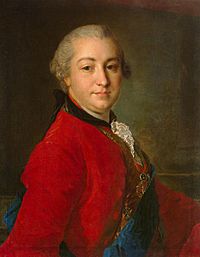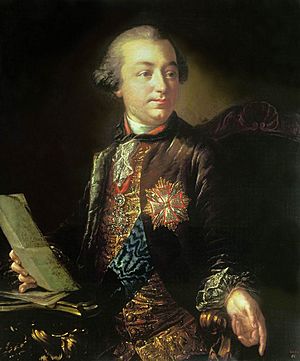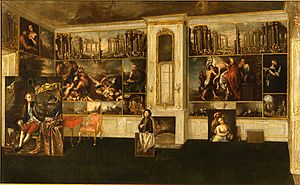Ivan Shuvalov facts for kids
Quick facts for kids
Ivan Shuvalov
Ива́н Шува́лов |
|
|---|---|

Ivan Shuvalov in 1760, as painted by Fyodor Rokotov
|
|
| Born | 1 November 1727 Moscow
|
| Died | 14 November 1797 (aged 70) Shuvalov Mansion, Saint Petersburg
|
| Occupation | Russian minister of education |
| Partner(s) | Empress Elizabeth Petrovna |
| Parent(s) | Ivan Menshoi Shuvalov Tatiana Rodionovna |
Ivan Ivanovich Shuvalov (Russian: Ива́н Ива́нович Шува́лов; 1 November 1727 – 14 November 1797) was a very important person in Russia. He is known as a great supporter of education and arts during a time of new ideas in Russia, called the Russian Enlightenment. He was also Russia's first Minister of Education.
Ivan Shuvalov played a big part in creating Russia's first theatre, its first university, and its first Academy of Arts. His work helped shape the future of learning and culture in Russia.
Contents
Early Life and Court Influence
Ivan Shuvalov was born in Moscow. He was the only son of Ivan Menshoi Shuvalov, an army captain who died when Ivan was just ten years old. His family's luck changed a lot in 1741. This was when Empress Elizabeth Petrovna became the ruler of Russia. Ivan's powerful cousins, Peter Shuvalov and Alexander Shuvalov, helped her.
The next year, when Ivan was fourteen, his cousins arranged for him to work at the imperial court as a page. In July 1749, Ivan was visiting his brother-in-law near Moscow. His cousins set up a meeting between Ivan and the Empress. She was on a religious trip at the time. The Empress, who was 40, noticed the handsome young page, who was 18 years younger. She asked him to join her on her next trip.
Three months later, Shuvalov was given the title of Gentleman-In-Waiting. He became a very trusted person at court. His cousins had hoped to use him for their own plans. But Shuvalov refused to get involved in their tricks. People who wrote about his life often said he was "kind and generous to everyone." They also said he "had no enemies at all."
His position at court became even stronger as Empress Elizabeth got older. He became like a main helper for her, handling many requests from people. He became more important than her previous trusted advisor, Aleksey Razumovsky. In 1760, he was made a general. But Shuvalov turned down most other special honors the Empress wanted to give him, like the title of count.
Supporting Education and Arts
Unlike some other powerful people, Shuvalov used his good fortune to help his country. He wanted to improve education and promote fine arts. He was a great example of an enlightened courtier, meaning he was interested in new ideas and learning. He wrote letters to important French thinkers like Helvetius, d'Alembert, Diderot, and Voltaire. He even helped Voltaire with his book about Peter the Great and later helped publish it in Russia.
Shuvalov's work connected him with Mikhail Lomonosov. Lomonosov was a Russian scholar who dreamed of starting a university in Russia. Shuvalov became a loyal supporter of Lomonosov. Lomonosov even wrote poems and "meditations" to honor Shuvalov's achievements.
On 23 January 1755, which was Shuvalov's mother's name-day, the Empress approved their plan. They wanted to set up the Imperial Moscow University. This university was meant "for all sorts and conditions of people." Today, this day is still celebrated in Russia as "Students Day."
Shuvalov became the university's first leader, called a curator. He brought in the best scholars to teach there. He also had the idea to start The Moscow News. This was a newspaper published by the university's own printing press, which Shuvalov also helped create. Besides Moscow University, he also helped set up the first Russian college outside Moscow, in Kazan. He was chosen as a Fellow of the Royal Society in 1758.
Founding the Academy of Arts
In 1757, Shuvalov presented a plan to create the Academy of Three Noble Arts. This academy would be at his own palace in Saint Petersburg. This school later became the famous Imperial Academy of Arts. Shuvalov imagined it as a place to educate the most talented boys from all parts of society.
At first, students did not need to pass a formal test to get into the Academy. Even children of peasants, like Fyodor Rokotov and Fedot Shubin, were allowed in. This was thanks to Shuvalov's personal recommendation.
Shuvalov was the Academy's first president until 1763. After that, Ivan Betskoy took over. In 1758, Shuvalov gave his own collection of Western drawings and paintings to the Academy. This collection became the start of its amazing art holdings. At that time, his palace also hosted performances by Russia's first theatre group. This group was led by Fyodor Volkov and Ivan Dmitrievsky.
After Empress Elizabeth died and Catherine II became ruler, Shuvalov traveled to Europe. He said he was going to improve his health. During his fourteen years of travel, he bought many beautiful works of art. These were for the Academy and the Hermitage Museum. He also ordered copies of the best Roman sculptures from Rome, Florence, and Naples. He later gave these copies to the Academy of Arts.
Later Years and Legacy
When he returned to Russia in 1777, the Empress made him a High Chamberlain. Shuvalov's mansion became a popular place for a new generation of Russian thinkers. Many of them, like Ekaterina Dashkova, Denis Fonvizin, and Mikhail Kheraskov, had studied at the university he founded. While living at his palace, the poet Ermil Kostrov created the first Russian translation of the Iliad.
Ivan Shuvalov never married and had no children. He died at the Shuvalov Mansion in Saint Petersburg on 14 November 1797. His tomb is in the Annunciation Church of the Alexander Nevsky Monastery.
In 2003, a statue of Shuvalov was put up in the courtyard of the Academy of Arts in St. Petersburg. The sculptor was Zurab Tsereteli, who is the current president of the Academy Shuvalov started. Another statue honoring Shuvalov was placed in front of the Moscow State University Library in 2004.
 | Georgia Louise Harris Brown |
 | Julian Abele |
 | Norma Merrick Sklarek |
 | William Sidney Pittman |



